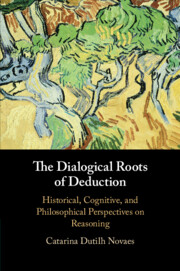 The Dialogical Roots of Deduction
The Dialogical Roots of Deduction from Part III - Deduction and Cognition
Published online by Cambridge University Press: 10 December 2020
This chapter presents an overview of experimental work on deductive reasoning, which has shown that human reasoners do not seem to reason spontaneously according to the deduction canons. However, there are also experimental results suggesting that, when tackling deductive tasks in groups, performance comes much closer to the canons. These findings offer a partial vindication of the dialogical conception of deduction insofar as they show that, when given the opportunity to engage in dialogues with others, humans become better deductive reasoners.
To save this book to your Kindle, first ensure [email protected] is added to your Approved Personal Document E-mail List under your Personal Document Settings on the Manage Your Content and Devices page of your Amazon account. Then enter the ‘name’ part of your Kindle email address below. Find out more about saving to your Kindle.
Note you can select to save to either the @free.kindle.com or @kindle.com variations. ‘@free.kindle.com’ emails are free but can only be saved to your device when it is connected to wi-fi. ‘@kindle.com’ emails can be delivered even when you are not connected to wi-fi, but note that service fees apply.
Find out more about the Kindle Personal Document Service.
To save content items to your account, please confirm that you agree to abide by our usage policies. If this is the first time you use this feature, you will be asked to authorise Cambridge Core to connect with your account. Find out more about saving content to Dropbox.
To save content items to your account, please confirm that you agree to abide by our usage policies. If this is the first time you use this feature, you will be asked to authorise Cambridge Core to connect with your account. Find out more about saving content to Google Drive.